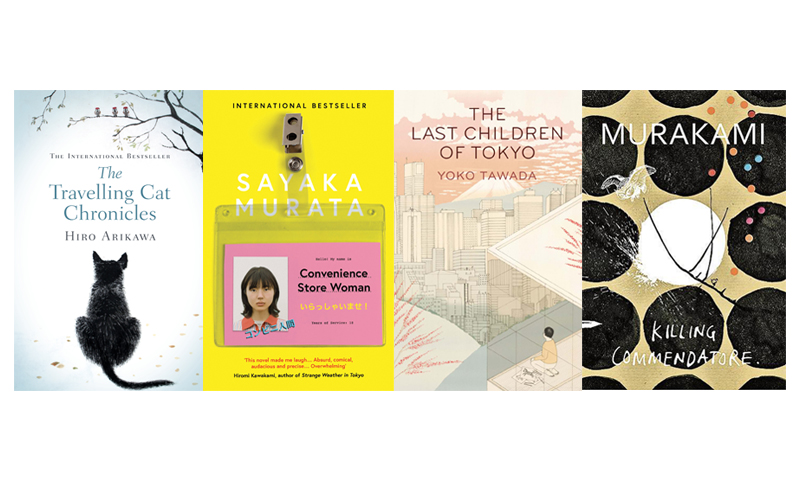
October 11, 2018
Five Best Japanese Novels of 2018
Metropolis lists this year’s best Japanese fiction
By Jessica Esa
The past few years have seen an explosion of Japanese novels being translated into English. This year has been no exception, with some of the best award-winning contemporary fiction coming out of Japan. Here are this year’s highlights — the fiction you really don’t want to miss.
The Travelling Cat Chronicles (Hiro Arikawa – tr. Philip Gabriel Jan 2018)
Japanese literature is no stranger to books about cats, but this is truly a worthy addition to what’s fast becoming a genre in itself. Our narrator in The Travelling Cat Chronicles is a simple, grounded male cat named Nana who is taken off the streets of Tokyo by his new owner Satoru.
After five happy years, Satoru takes Nana on a road trip to visit his old friends and to see the transformative landscape of today’s Japan. We soon realise that for whatever reason, Satoru will no longer be able to look after Nana.
What makes this novel so delightful is experiencing Nana and Satoru’s journey together — throughout which we read stories about Satoru and the many people who have colored his life. What starts as a simple tale takes us on an emotional journey that will move the hardiest of readers.
The Last Children of Tokyo (Yoko Tawada – tr. Margaret Mitsutani June 2018)
We catch a glimpse into a near dystopian future with Yoko Tawada’s high-concept and highly satirical new novel: The Last Children of Tokyo. Here we meet Yoshiro, a retired author. He has passed his hundredth birthday but his world is one where children no longer make it to adulthood and the population is in jeopardy. Yoshiro’s great-grandson Mumei is born, like every member of his generation, with grey hair and a low life expectancy.
With this novel we face a Japan where the cities have mostly been abandoned; ties with the rest of the world have been severed; other languages are no longer taught or spoken; and real animals are scarce. Tawada explores our current political climate with finesse and pulls out some of the very real fears that are plaguing not just Japan, but the world at large.
Convenience Store Woman (Sayaka Murata – tr. Ginny Tapley Takemori July 2018)
Keiko Furukura is thirty-six and has worked part-time in the same convenience store for eighteen years. Having felt like an outcast all her life, she finds normality and a sense of purpose in her work. She is entirely content and has never asked for anything more. However, she faces constant societal pressure from her sister and friends — pressure to get a better job, to get a boyfriend, to go out more.
She meets Shiraha, an angry young man who is unhappy with society and his lot in life; he serves as an anti-hero to Keiko and their interactions are nothing short of uncomfortable and, at times, hilarious.
Convenience Store Woman serves as a critique of the way single women are treated in Japan and how we view the worth of a job, but above all it’s a love letter from Keiko to the stores we’re all so familiar with.
Killing Commendatore (Haruki Murakami – tr. Philip Gabriel & Ted Goossen October 2018)
A new Murakami book always comes with its own level of hype, but this new novel does not disappoint and will easily satisfy fans of Murakami’s previous novels, containing (as it does) all the tropes that he has become synonymous with over the years.
The story revolves around an unnamed portrait painter who has been abandoned by his wife and has chosen to become the caretaker of the home of Tomohiko Amada, a once-famous painter in his own right.
The book’s title and the surreal events that ensue are kick-started when our protagonist discovers a painting in the attic named “Killing Commendatore”, inspired by the opera Don Giovanni. With a slew of enigmatic characters, a preoccupation with art and the creative process — and in many ways an homage to a book that Murakami famously adores — The Great Gatsby, this is a hefty and surreal novel not to be missed.
Lonesome Bodybuilder (Yukiko Motoya – tr. Asa Yoneda November 2018)
Perfect for fans of absurd, dark humor, these eleven short stories are the long-awaited English language debut of one of Japan’s favorite young writers.
Kafkaesque in their tone, each story takes an aspect of mundane Japanese life and turns it on its head. A stale marriage heading towards its twilight years becomes a wife’s secret bodybuilding training while her husband stays oblivious; a normal day in a clothes shop turns into a 24-hour nightmare for the attendant as she tries to find clothes for a customer who won’t leave the changing room.
In Japanese contemporary fiction, we’re often given a slice of life and that life is explored to its fullest. Motoya has managed to achieve that same feat within a few pages and then turn it on its head in the most ridiculous manner. Masterful.







